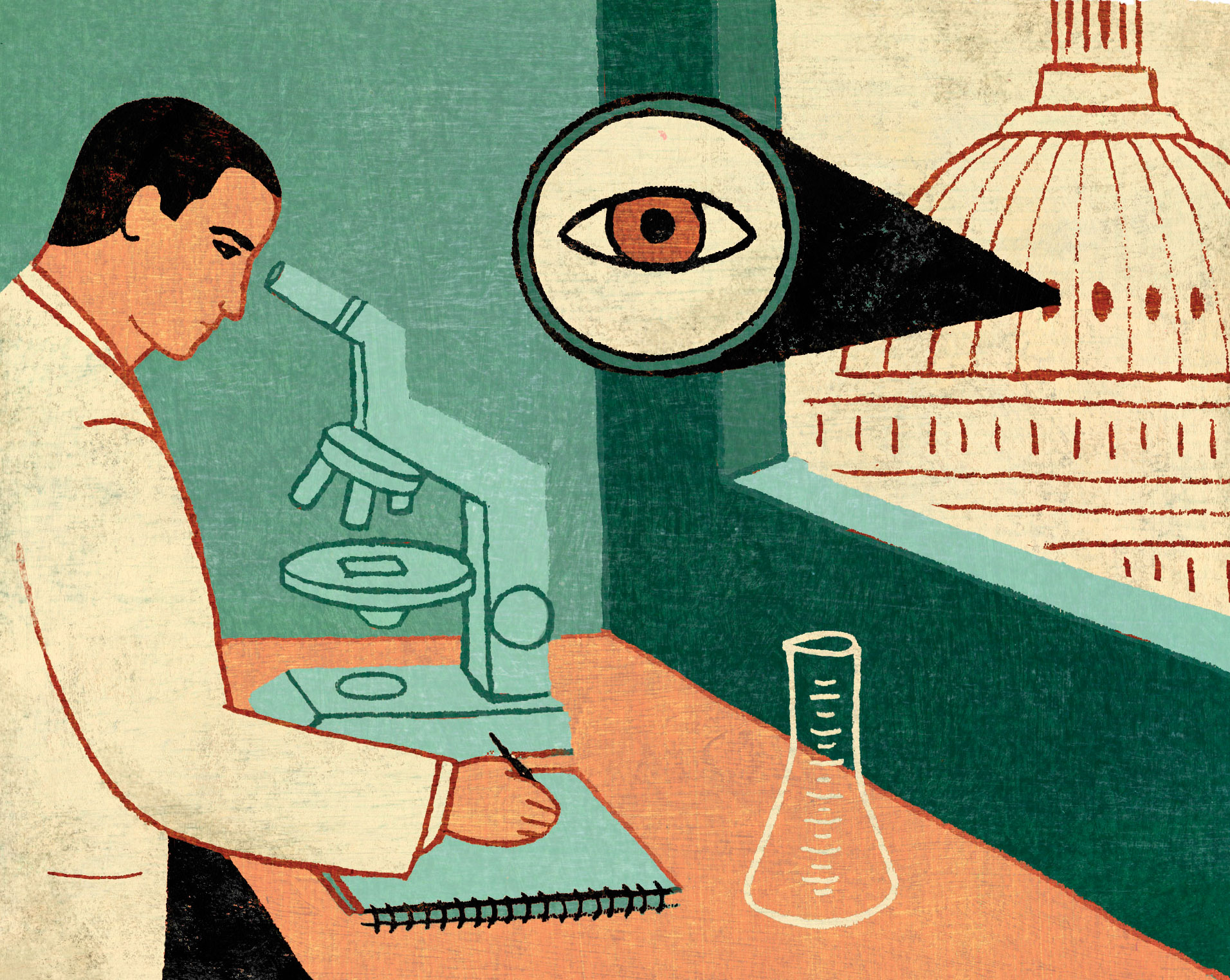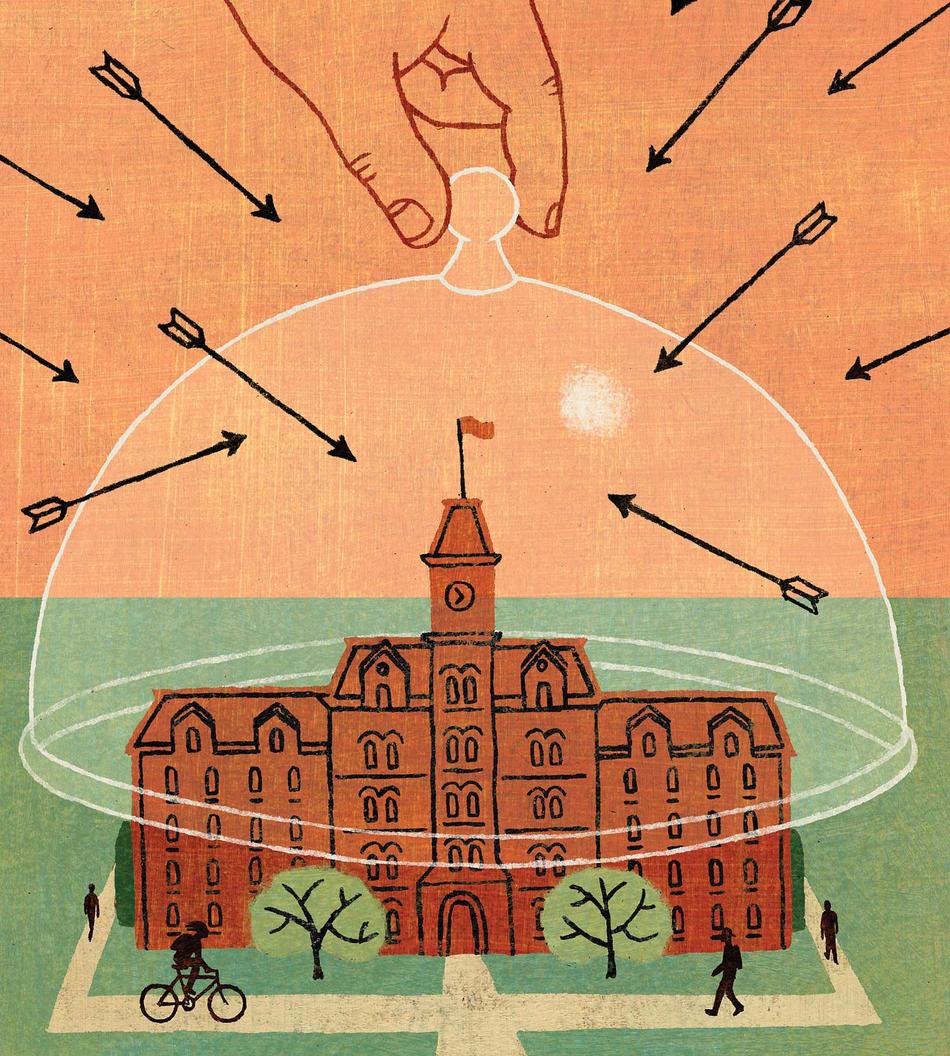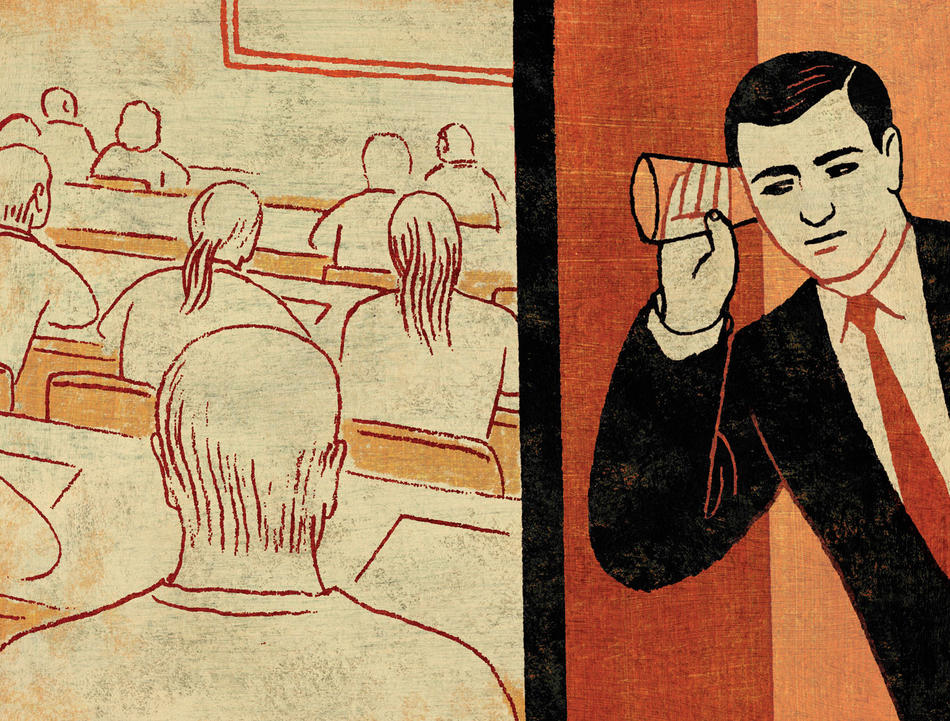
In a hefty new book, sociologist and provost emeritus Jonathan R. Cole describes how research universities in the United States became the best in the world — and how they are now under assault from multiple quarters. Cole ’64CC,’69GSAS, who is currently John Mitchell Mason Professor of the University, discusses The Great American University: Its Rise to Preeminence, Its Indispensable National Role, Why It Must Be Protected.
You have written a great deal about universities’ contributions to society: the role of universities in medical treatment, breakthroughs in physics and electronics, advances in our understanding of climate and earth sciences. At the same time, you say you are surprised by how little not only the public, but even students, know about those contributions and about how a university is run.
It’s true. Students are here to take their courses, to learn, and then to go out into the world. No one tells them about the place they have entered, except that it’s wonderful. No one gives them a history of the institution. No one explains why we organize universities the way we do. I teach a graduate course on the university in American life and I ask my students, Why does society have universities? What are the missions of universities? Why do we organize them the way that we do? Why do we have a law school? Why do we have undergraduate education? Third-year law students look perplexed. Graduate students look perplexed. They have not really thought about it. The remarkable thing is that most of our own faculty and even some trustees haven’t a clue about how universities are organized, how they really work, and — to some significant degree outside their own disciplines — how they contribute to the welfare of American society or to our daily lives.
Your book is mostly about graduate schools and research institutions, places that deal more with the discovery of new information than with the transmission of information from one generation to the next.
One of the extraordinary features of American universities is the close relationship between teaching and research at the graduate level. Many of the discoveries in laboratories at these universities are made by graduate students and by postdoctoral students working under the close supervision of faculty mentors.
The European system is quite different.
Europe made a decision a long time ago to separate the research mission — which they have handed over to government-based laboratories, like the CNRS [Centre National de la Recherche Scientifique] in France, or to institutes like the Pasteur Institute — from the universities. Of course that’s the least of the problems of the French system, and the German system, and the Italian system. There are many deep structural problems with European universities today, including the tendency for them to be hierarchical, much less democratic than ours. When the great German physicists and scholars came to the United States as a result of Hitler, they were struck and delighted by the democracy in the laboratory and the classroom — the give-and-take. That does not exist traditionally in German or French universities. For that matter, it certainly doesn’t exist in Chinese universities. In China, the hierarchical arrangement of master and apprentice has been a tradition for thousands of years.
In France, in particular, there has been a split for 200 years between the grandes écoles and the major research institutes on the one hand, and every other university on the other. The well-funded grandes écoles are the elite schools; the other institutions are underfunded, overcrowded, and mostly mediocre.
Do you see the potential of there one day being a two-tiered system like this in the United States? The richest institutions — Harvard, Princeton, Stanford, and so on — and then everybody else?
The growing inequality of wealth among even the private universities concerns me a great deal. Think about their endowments: Even with the losses of the last year or two, as the markets reequilibrate themselves and the endowments grow again, you’re going to have a doubling factor every 7 to 10 years. We could be in a situation that is much more akin to what England has, with Cambridge, Oxford, Imperial College of London for certain specialties, and the London School of Economics, and then the rest.
It would be extraordinarily unfortunate if the competition among great American universities for the best and most talented people were to dissipate and we were to find ourselves in a situation where the University of Chicagos, the Columbias, and the Penns of the world have become farm systems for the wealthy elite graduate programs. That would have enormous negative repercussions on the growth of knowledge.
One of the key sections of your book is the discussion of academic freedom. Could you explain the distinction between academic freedom and freedom of speech?
Academic freedom provides faculty with freedom that really goes beyond the normal rights that we have as citizens under the First Amendment. The essential difference is that academic freedom defines the relationship between faculty members and the administration — the trustees, the administrative leaders — and that it defines the rights and obligations of the faculty members. Historically, it began with giving faculty the right to determine the curriculum and the right to evaluate the quality of teachers and students. It is the ability of faculty members to govern themselves in certain areas without interference, whether from the university’s central administration or from the government.
That does not mean there are not speech components. Academic freedom allows faculty members, after all, to determine what will be studied in the classroom, to organize the classroom as they see fit, to engage in conversations about ideas or experiments that might be radical, with the expectation that there will be a set of rigorous, conservative methods used to test the truth and value of those ideas.
I use the case of Stanley Prusiner in the book. For more than 100 years we had believed that there are only two sources of disease: bacteria and viruses. In 1982, at the University of California, San Francisco, Prusiner proposed that there was a third cause of disease, called prions. Well, he was appropriately and strongly resisted — he couldn’t get grants from NIH. His radical idea is held up to rigorous standards of evidence, and in the end he proves that he was right and wins the Nobel Prize in 1997. There are still people who resist the idea of prions, but overwhelmingly people accept it. This has happened many times in the history of science. The same thing should go on in other fields.
You argue that the essence of the university is to question orthodoxies and state policies. Yet universities receive money from the state.
It’s a paradox. We expect the people who support us not to interfere with our criticisms.
You don’t want the people who feed you to watch you eat.
Exactly. We are assuming — because it’s very hard to get real evidence on this — that without free inquiry, and without academic freedom, we couldn’t do our jobs well. The growth of knowledge would be impeded and our students would be less well trained. Our mission in the society is to generate better-trained students who are prepared for certain kinds of work, to be better citizens in the democracy, and to produce knowledge that will be useful for the society. To the extent we deliver on that, we expect the state to allow us to be basically autonomous.
Are you telling society and the government, You just have to trust us?
There’s a tremendous element of trust, and if we lose that trust we will see more government interference. That will lead to the degrading of the quality of these universities.
I want the graduates of our universities to understand what these universities actually do for the society, and why, given the quality of what we’ve produced and how we have changed their lives, they should support us against the possible intrusion not only by government, but by external organizations that may not like what we’re doing.
Much of the distress that one senses from your book has to do with the turn of events in academia following September 11, 2001. You write that we can find a host of examples of attacks on free inquiry during the following years that “may have been more harmful to the structure of the university than we found even during the McCarthy period.” Were you being hyperbolic?
The McCarthy period was devastating. Professors were fired, people who wouldn’t sign loyalty oaths were fired, individuals who refused to testify before the House Un-American Activities Committee were fired. It was all focused on speech, and on one’s affiliations and political sympathies. One of the things that differentiates the current period is that the attack has been less on speech — although there are examples of it — and more on research, which is less visible. But it still has aspects of the anti-intellectualism that was part of the McCarthy period, and which, as Richard Hofstadter taught us, rises up periodically in American society.
The resistance to stem-cell research is one example of this; the unwillingness to allow science to grow in that area for ideological reasons was quite unnecessary. Another example is the ironic halt to immunological research focused on finding cures and vaccines for major scourges and diseases. I quote Cornell’s Robert C. Richardson, who won the 1996 Nobel in physics. He describes how before 9/11 and the passage of the USA Patriot Act, the Health, Safety and Security Act, and the Bioterrorism Act, there were some 38 laboratories at Cornell working specifically on what are called select agents — those toxins, viruses, and bacteria that could cause lethal diseases and which bioterrorists might like to get their hands on. Well, the repressive nature of government interference with those laboratories’ work resulted in there now being only two laboratories at Cornell continuing to work on those problems. The nation’s loss is that we don’t have the progress toward vaccines, antidotes, and various ways of dealing with these diseases. So rather than use universities and their research potential effectively as a defense for the nation, the government, through its interference, has effectively eliminated lines of research that were very, very promising.
Was it incompetence or do you see actual maliciousness?
I think there was a combination. There was a level of anti-intellectualism in the broader society. And fear tactics were part of the prior administration.
Of course we’re more than a year into a new administration.
I have no doubt that President Obama understands the nature of research universities and values them greatly. Restrictive visa policies that treated foreign students as if they were enemy aliens have gotten somewhat better and more relaxed. On the other hand, there has been no effort, for example, to change legislation that protects people at universities against library surveillance. Nothing has been changed in the antiterrorism acts. My guess is, given the attempt to bomb the plane on Christmas, nothing will be done. There’s such fear in Washington of being soft on terrorism that I don’t think that legislation passed in the Bush era is going to be rescinded soon.
Could you talk about area studies and Title VI programs?
These programs were crafted after the Second World War to help the nation improve its expertise about foreign cultures. They included language and culture studies. The great universities have dominated the receipt of grants of those kinds. There was an enormous outpouring of anger at these centers in the last eight years because there was a perception that they had a strong liberal bias — that they were, in some ways, promulgating anti-American values within the universities in the United States. And the government began to explore — at the instigation of certain private organizations like Campus Watch and others — monitoring these programs and their curricula from the inside. The Bush administration was supportive of this. Members of Congress were supportive of this. They wanted to have committees to look into the curricula, which is normally the prerogative of the faculty at these universities. That is a huge intrusion into the academic freedom of universities and the ability of the faculty and its leaders to choose what is taught and what is not taught. Again, there is the issue of trust. The final piece of legislation, the reauthorization of the Higher Education Act, contained language that still allowed, to some extent, government oversight of these programs for ideological reasons. This has a very chilling effect on what goes on at universities.
Was there any legitimacy to the complaints from outside that some departments had become politicized?
I don’t believe so. You hear continually that the faculties of these universities are biased, and that they are trying to persuade students to think in certain ways. First of all, I think that there’s much more diversity in faculty opinion than we think. There are many people who hold diverse views about the Middle East in Columbia’s faculty, for example. People tend to see the focus on a few members of the faculty who hold critical views of Israeli government policies. But there are people at Columbia and elsewhere who certainly can join in that conversation, and can question whether or not these faculty members are espousing ideas that are false.
Still, I don’t think you are suggesting that faculty are immune from external criticism. If we assume that some nonfaculty critics — alumni, the press, or anyone else — are well informed and act in good faith, should their voices be heard?
Obviously, people outside the university have as much right to criticize anything that goes on as people inside the university. I don’t want to in any way restrict the freedom of speech and expression of those outside to what people may be doing inside.
However, it’s extremely important that the leaders of universities both defend their faculties’ right to express ideas and also reinforce the idea that the criticism can come from within and should come from within — among peers, students, even among other people in the university community. But the ultimate judge of the quality of the work and whether or not a person should be hired or promoted has to be left up to experts in those fields.
That brings us back to your point that academic freedom sets the rules of engagement in a classroom or laboratory: “Great universities are designed to be unsettling. They challenge orthodoxies, and dogmas, as well as social values, and public policies.”
It’s almost a precondition for greatness. To the extent that you stifle academic freedom, you undermine the university’s values and its potential for contributing to the nation and to the world, because you stifle the growth of knowledge. You are also going to stifle the extent to which students are challenged in their own biases and presuppositions. That, after all, is what a university ought to be about.




